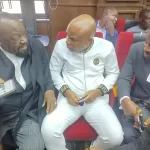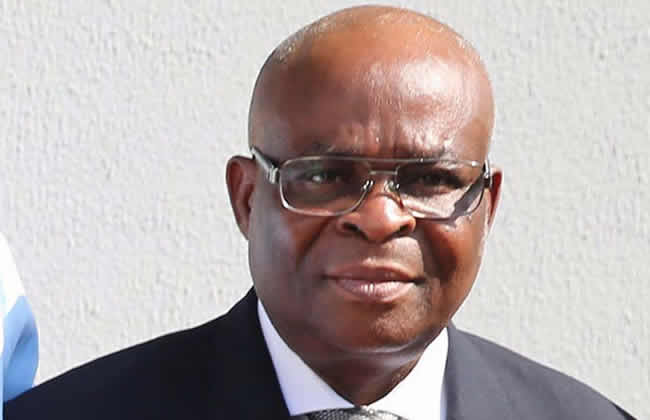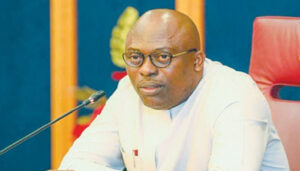Barring any last minute discourse, the Court of Appeal Abuja division will on Tuesday (today) hear a suit filed by former Chief Justice of Nigeria (CJN), Justice Walter Onnoghen, challenging the Code of Conduct Tribunal, (CCT), order that removed him from office in 2019.
The suit was filed at the Court of Appeal in 2019.
In his appeal, Onnoghen is praying the Court to nullify and set aside the CCT judgement delivered against him on April 18, 2019, on various grounds.
In the appeal marked CA/ABJ/375 & 376 & 377/2019, Justice Onnoghen through his lead counsel, Adegboyega Awomolo, (SAN), is urging the appellate court to quash his conviction specifically on ground of want of jurisdiction, bias and absence of fair hearing.
Onnoghen is the appellant while the Federal Republic of Nigeria is the sole respondent.
A notice for hearing of the appeal sighted by our correspondent is titled, “CA/ABJ/375 & 376 & 377/2019 BTW: Justice Onnoghen and FRN”.
Recall that the Code of Conduct Tribunal had in 2019 convicted Onnoghen in all the 6-count charge of breach of Code of Conduct for Public Officers brought against him by the Federal Government while in office as CJN .
In the lead judgement delivered then by Chairman of the CCT, Danladi Umar, he had ordered the immediate removal of Onnoghen from office as the CJN.
The Tribunal had also stripped him of all offices earlier occupied among which were the Chairman of the National Judicial Council (NJC), and also the Chairman of the Federal Judicial Service Commission.
The tribunal also ordered the forfeiture of his five bank accounts and the money in the accounts which Onnoghen did not declare in his asset declaration form submitted to the Code of Conduct Bureau, CCB, an agency of the Federal Government.
Although Onnoghen had been on suspension since January 25, 2019 and had resigned on April 4, the tribunal nonetheless ordered his removal from office as the Chief Justice of Nigeria and also as the chairman of both the National Judicial Council and the Federal Judicial Service Commission.
However, dissatisfied with the CCT decision, Onnoghen in 2019 approached the Court of Appeal with 16 grounds on why his conviction by the Tribunal should be quashed.
Amongst other grounds, he maintained that the Danladi Umar-led CCT panel erred in law and occasioned a miscarriage of justice against him, when it failed to decline jurisdiction to entertain the six-count charge against him.
He contended that the CCT Chairman ought to have recused himself from presiding over his trial.
In his seven-point reliefs, Onnoghen, applied for an order setting aside his conviction as well as quashing the order for forfeiture of his assets and to discharge and acquit him of all the charges levelled against him.
Listing some of the particulars of error in the CCT’s judgement, Onnoghen argued that he was s judicial officer at the time the charges were filed against him on January 11, 2019 and as such cannot be subjected to the jurisdiction of the lower tribunal.
“0n the authority of Nganiiwa v. FRN (2018) 4 NWLR (Pt. 1609) 30: at 340. 341 only the National Judicial Council (NJC) has the power to discipline the Appellant for misconduct and not the lower tribunal.
“The lower tribunal had in the case of FRN V. Sylvester Nwali Ngwuta in charge No: CCT/ABJ/01/2017 delivered on 9th January, 2018, affirmed the position of the Court in Nganjiwa v. FRN .
The court further dismissed the charges, acquitted and discharged Justice Ngwuta being a Judicial Officer subject only to the discipline of the National Judicial Council.
“The lower tribunal has no jurisdiction over serving judicial officers such as the appellant, save the National Judicial Council.
“The Motion on Notice dated January 14, 2019, challenging the jurisdiction ought to be granted in all material particular as it purports to save the lower tribunal of needless futile exercise.
“The lower tribunal erred In law when it dismissed the Appellant’s Application seeking the chairman to recuse himself from further proceedings on the ground of real likelihood of bias and thus occasioned a miscarriage of justice.
“The Appellant has alleged that the chairman of the lower tribunal is biased towards him as a result of open remarks in the tribunal as well as the manner in which the proceedings was being conducted.”
Contrary to the CCT finding, Onnoghen, submitted that he did not admit the fact of non-declaration of Assets from 2005 as the Justice of the Supreme Court, adding that he only stated that he did not declare in 2009 as required because he forgot.
Onnoghen challenged the order for the confiscation of his assets on the grounds that the assets were legitimately acquired, as against the provisions of paragraph three of Section 23 of the CCB Act which only permits the seizure of such assets “if they were acquired by fraud.”
He faulted the failure of the prosecution to bring the petitioner, Denis Aghanya, before the tribunal whose petition led to the charges against him.
Onnoghen maintained that all the allegations brought against him “constitute no offence and should therefore not have formed the basis for his conviction”.
The former CJN asked the Court of Appeal to issue some orders against the CCT judgement among which are that the tribunal lacks the jurisdiction to entertain the case and that its Chairman ought to have recused itself from the proceedings.
He therefore applied for an order setting aside his conviction and another order setting aside the order for forfeiture of his assets made by the Tribunal as well as to discharge and acquit him from the charges.










More Stories
Natasha accuses Akpabio of getting kickbacks from Senate Committee chair, says Senator Karimi trolls her weekly with jail threats
Police repel herdsmen attack on students writing WAEC in Benue
Native doctor who was arrested over alleged ritual killing, claims innocence